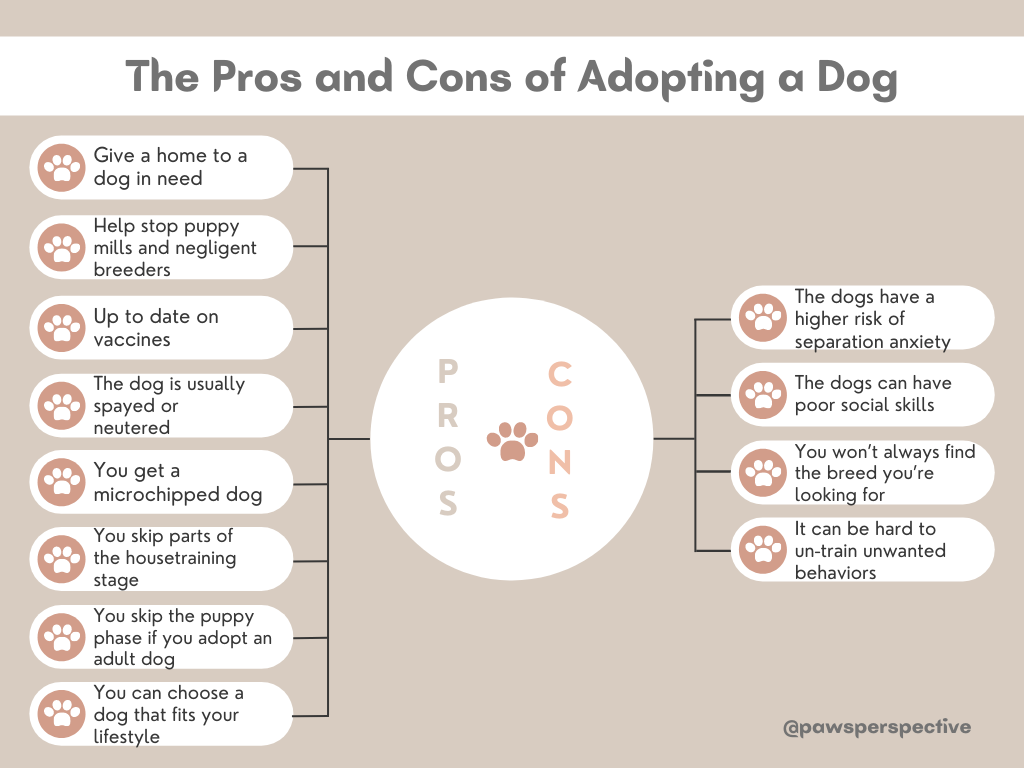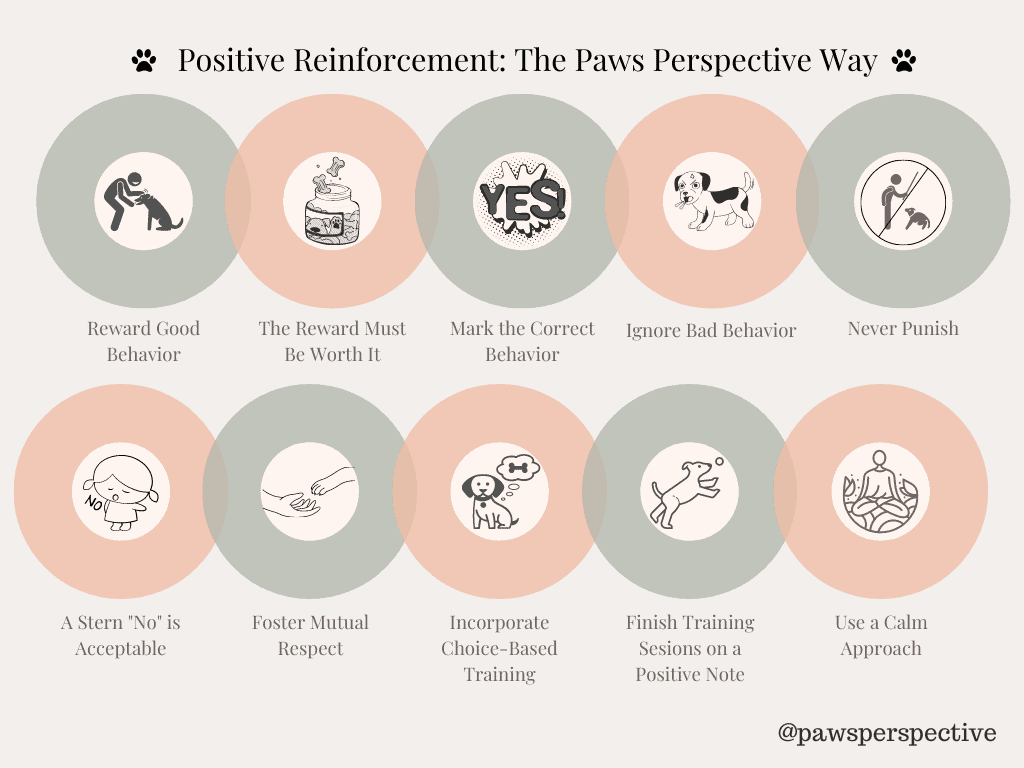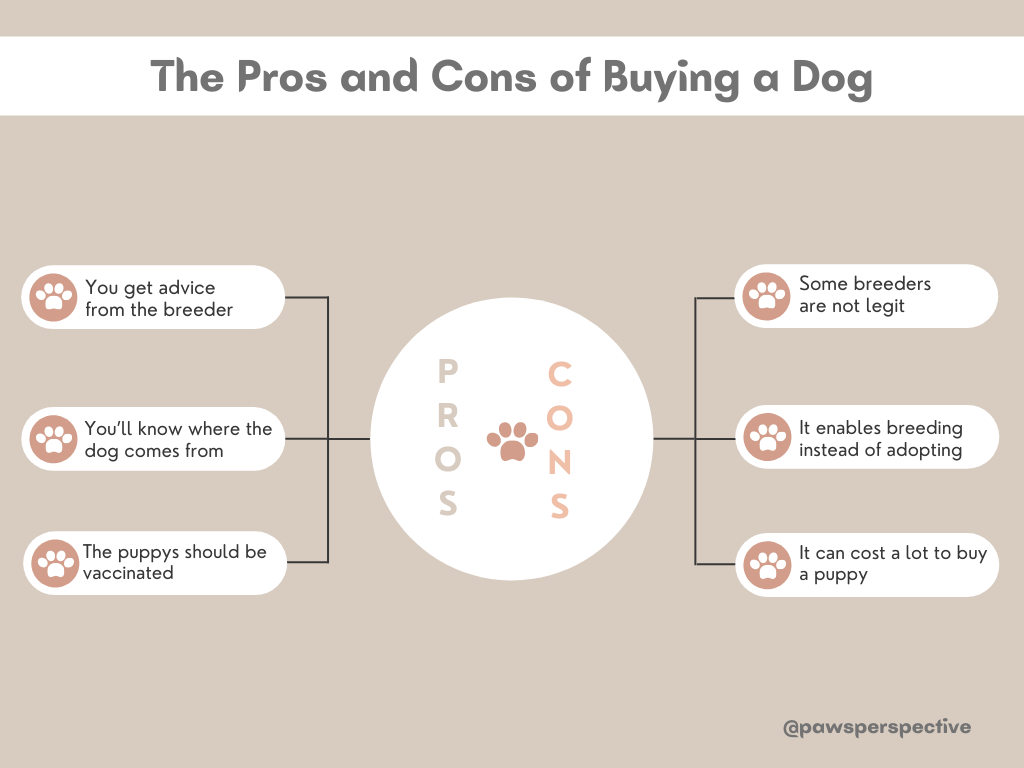
When you want to get a dog, the question might be: should I buy or adopt? I’ve worked with people who bought dogs from breeders and adopted dogs from rescue shelters. So, the answer depends on your preference, but there are a few things you need to consider.
There are pros and cons to buying or adopting a dog. So, there is no right or wrong answer. But to make your decision easier, I’ve gathered information about these pros and cons. Please look at them and see which option you resonate with best.
Remember, you should do what makes yourself feel more comfortable. The happier you are with your decision, the better your dog’s chances are for a good and happy life. Not only that, but you won’t end up regretting your choice!
Adopting a Dog
You can adopt a dog at your nearest rescue dog shelter. They usually take in unwanted dogs whose owners don’t want them anymore. Or, they take stray dogs off the street to give them a better life.
According to the ASPCA, 3.1 million dogs enter animal shelters in the USA every year. And of those dogs, only 64% get adopted. That means that 36% of those dogs don’t get forever homes of their own
Pet Statistics, ASPCA
The statistics are almost the same worldwide. Animal shelters are full and sometimes have to go to extreme lengths to maintain their capacity. While there are many pro-life shelters, some put dogs down if they get too full. But that’s a blog for another day.

The Pros of Adopting a Dog
Both my brother and my sister adopted dogs from a rescue shelter. Sansa, my brother’s dog, and Akai, my sister’s dog, are fun, loving, and loyal to the bone. I’ve also seen many dog parents who decided to adopt and couldn’t be happier. So, without further ado, let’s examine the pros of adopting a dog.
Give a Home to a Dog in Need
When you adopt a dog, you give a better life to a dog that was rejected either by their owners or who didn’t have a home to start with. You provide them with a purpose and a renewed will to live. To this dog, you bring hope and freedom from a closed-in life.
There are so many dogs in animal shelters worldwide that need homes forever. Some are lucky enough to get adopted, but others stay in the shelters for years. Because shelters tend to be overcrowded, there aren’t enough staff members or volunteers to walk every dog daily. Some dogs stay in their enclosure for days, if not weeks, on end.
So, adopting means that you’ll change one dog’s life forever, for the better.
Help Stop Puppy Mills and Negligent Breeders
Some dog breeders don’t keep up with breeding standards and aren’t licensed by the United States Department of Agriculture (USDA) or whichever regulating body of their country. Unfortunately, some are puppy mills or backyard breeders who only care about the money, not the health and safety of the dogs.
I’m not talking about responsible breeders here. I commend those who take their breeding practices seriously with the utmost respect for canine life! I’m mentioning those who put puppies and their moms in cages or bad conditions without regard for hygiene, health practices, or protection.
So, you help combat illegal or inhumane breeders whenever you adopt a dog. The fewer people buy from them, the less likely they will continue breeding dogs in poor conditions.
Up to Date on Vaccines
Animal shelters usually vaccinate dogs against various diseases. However, remember that this can vary depending on the dog’s age at adoption. It means you won’t have to spend money on their first dose of vaccinations.
In short, “A vaccine is a preparation of either killed or altered microorganisms that is administered into the body.”
VCA
There are two considerations, though, and that’s whether you adopt a puppy or an adult dog:
- If you adopt a puppy, the shelter will give the first few vaccines to the pup. But, you will have to follow up with the vaccination schedule in the puppy’s first year.
- If you adopt an adult dog, the shelter ensures the dog is up to date with all their vaccines, so you only have to keep up with the annual vaccines a year from the adoption.
Whichever you choose, you still save a bit of money on vaccination costs and have peace of mind that your dog is protected against common canine illnesses.
The Dog is Usually Spayed or Neutered
Animal shelters usually spay or neuter dogs before going to their forever homes. If the puppies are too young, some shelters will provide free spay or neuter services. That means you likely don’t have to pay for the procedure yourself.
Not only is it more cost-effective, but it also means that you won’t struggle with a bitch in heat (if you’re adopting a female dog) or have unwanted puppies in the future.
You Get a Microchipped Dog
A microchip is a small device a veterinarian implants just below your dog’s skin. It is linked to a specific tracking number with your contact details. Then, if your dog is lost and someone finds them, they scan the dog for a microchip and return your dog safely.
Some animal shelters microchip the adopted dogs. They do this to help reduce the number of lost pets. So, when you adopt a dog, they may already have a microchip, helping you save on those costs.
You Skip Parts of the Housetraining Stage
Most adult shelter dogs are housetrained already. Because these dogs either had a previous home or dwelled on the street, they prefer to do their business outside. So, you don’t have to go through the whole house training stage. On the other hand, if you adopt a puppy, you still need to undergo some housing steps.
However, remember that going to a new home means different routines, exits, and environments can affect how well your newly adopted dog would remember their housetraining.
So, as a rule, you can assume you’ll need to show your new dog the ropes before they know where they can do their business. Don’t worry; the re-training process is usually quicker than the initial training.
However, some dogs may mess inside the house because of separation anxiety or other underlying conditions. If this is the case, be kind and understanding to your pup. They will adapt as soon as they realize they’re safe and well cared for.
You Skip the Puppy Phase if You Adopt an Adult Dog
Adopting an adult dog doesn’t have to go through the busy and tiring puppy phase. For instance, you skip constantly waking up, setting essential boundaries, and teaching the pup how to be a well-adapted dog.
This is especially helpful if you want a companion but don’t want to go through the hassle of training a puppy from scratch.
You Can Choose a Dog That Fits Your Lifestyle

When you adopt a dog, especially an adult dog, you can choose the type of dog that fits your lifestyle. That’s because you can see their developed personality traits and mannerisms before you decide to take one home.
So, ask yourself, do you want a dog that is:
- Active to go on adventures with you?
- Calm and enjoys leisurely activities with you?
- Hyper focussed and needs lots of training?
- A large breed?
- A small breed?
- A medium breed?
- Good with children?
- Good with people in general?
- Etc.
The shelter staff knows each dog’s traits and can tell which dogs are more suited to which lifestyle. It’s a win-win for you both! That way, you get a dog that will complete your life while you complete theirs.
The Cons of Adopting a Dog
Although adopting a dog is noble and selfless, it can have cons. So, before you adopt, consider the cons to help you decide. You have to be willing to live with each dog’s good and the tricky, no matter where you get them. As long as you’re well informed, you can make the best possible decision for yourself and your family.
These dogs Have a Higher Risk of Separation Anxiety
Separation anxiety in dogs is similar to human panic attacks. It is an insane fear of being left alone where the dog’s mind and body feel stressed. It’s not just stress, and the dog isn’t spiteful. They are just genuinely afraid that some harmful event will happen when the owner isn’t there.
Because most dogs in shelters come from other homes, they feel abandoned. It can cause the dogs to fear being left alone in the future. So, they might act out and try to alleviate the anxiety through unwanted behavior, like barking, chewing, or messing inside the house.
So, when you decide to adopt a dog, remember that they might struggle with separation anxiety initially. It takes dedicated effort to help a dog overcome separation anxiety, but it is possible!
The Dogs Can Have Poor Social Skills
Some shelter dogs struggle to be social, so they appear aggressive or extremely shy when they first come to their new home. It’s not necessarily a behavior that will last forever, but it can be tricky to manage if you’re not prepared.
The sad part is that most of these shelter dogs had one of two main issues affecting their social skills:
- They didn’t get enough social exposure to people and animals.
- They had negative experiences with social interactions.
Unfortunately, these dogs find it hard to trust that social interactions are safe if this is the case. Luckily, it’s easy to manage. You just need time, patience, and lots of kindness and love. These dogs need to start trusting that social interactions won’t harm them. They need to see that they are safe.
You Won’t Always Find the Breed You’re Looking For
Animal shelters won’t always cater to your breed preferences. The dogs surrendered to them, or the ones they found roaming on the streets are all they have available. So, you won’t necessarily get the breed you’re hoping to adopt.
It’s not that big of a problem, though. If you truly love dogs and want to adopt one as a companion, the breed won’t matter. All that matters is their personality traits and how well they will fit into your lifestyle.
However, if you love a specific breed, you can always ask all your surrounding animal shelters to let you know if the breed of your choice becomes available. So, you’ll still get the breed you’ve wanted but also have the opportunity to adopt an otherwise unwanted dog.
It Can Be Hard to Un-Train Unwanted Behaviors
Some shelter dogs come with behavioral issues. It can be behaviors taught in their previous home, or they didn’t get the chance to learn what is acceptable in human households. So, you might need to train unwanted behaviors out.
With shelter dogs, especially, it takes lots of patience and kindness to un-train these behaviors. Remember, some of these dogs came out of abusive homes and will shut down when they experience the same fear or sense of abandonment they had in their previous homes.
So, positive reinforcement is the best way to manage these potential issues.

The most common behavioral problems in adopted dogs are:
• Separation anxiety
• Aggression toward people & pets
• Resource guarding
• Destructive behavior
• Housetraining regression
• Poor social skills
• Leash reactivity & barrier-related aggression
• Constant whining
Bryan Curly is an activist for adopting dogs and founded Pet Lists. He advises on managing these common behaviors in his blog, “8 Behavioral Problems with Shelter Dogs (With Tips to Fix)”. So check out his blog site for more advice about adopting dogs.
When it comes to adopting a dog, there will undoubtedly be challenges, and you should keep the pros and cons in mind when you make this decision. However, any dog will have challenges, regardless of whether you bought or adopted them.
Buying a Dog
In this day and age, it’s so easy to buy a dog on the internet. While many reputable breeders strive to put the dogs’ needs first, some don’t care about a dog’s wellbeing. So, you’ll want to consider where you buy the dog and what condition they’re in.
As with adopting, there are pros and cons to buying a dog. If adoption isn’t for you, consider every positive and negative aspect of your decision. It will help you prepare to become the best dog parent you can be while ensuring you look after your dog’s needs.

The Pros of Buying a Dog
I bought my cocker spaniels from different breeders when I trained to become a dog trainer. It was essential to know where they come from to predict their personality traits and ensure they’ll be good companions during my training period.
I have trained many people who bought dogs from reputable breeders. They love their dogs, but some have to cope with their challenges. So, to ensure you’re as informed as you can be before making your decision, let’s look at the pros and cons of buying a dog.
You Get Advice From the Breeder
Legitimate breeders follow strict rules set by their country’s regulatory body to ensure the best breeding practices, taking care of both mom and pups. These breeders know their chosen breed and can give you breed-specific advice when you buy a puppy.
When you buy a puppy, the breeders can give you advice on several topics, like:
- What the puppy’s parents are like, giving you an idea of how your puppy will turn out.
- Feeding advice: what and when to feed your puppy
- Housetraining tips
- How to stimulate your puppy mentally and physically
- How to keep with the vaccination schedule
- How to socialize your puppy
- How to manage the specific breed throughout the different development stages
- Etc.
So, when you choose a breeder, though, keep in mind to look for responsible breeders. As I’ve mentioned, most countries have regulatory bodies that set standards for ethical breeding, and some even have laws on how to breed responsibly. So, these experts can tell you all you need to know about your new puppy.
Here’s a list of the dog breeding regulatory bodies in a few countries:
| Country | Dog Breeding Regulatory Body |
| United States of America | The United States Department of Agriculture (USDA) |
| South Africa (where I come from) | The Kennel Union of South Africa (KUSA) |
| France | The French Kennel Club (SCC) |
| Australia | The Australian Association of Pet Dog Breeders Inc |
| New Zealand | Dogs New Zealand, formerly the New Zealand Kennel Club |
| Canada | The Canadian Kennel Club (CKC) |
| The United Kingdom (England, Scotland, Wales, and Northern Ireland) | Several legislations regarding puppy breeding |
You’ll Know Where the Dog Comes From
When you buy a puppy, especially from an ethical breeder, you can see where your puppy or dog comes from. The more background you have regarding your dog’s environment, parents, and health status, the easier you can decide whether you want to buy that specific puppy or not.
When you choose a breeder, you can ask them to look at the puppy’s parents. Looking at the parents will give you an idea of what kind of puppy you’ll have. You will get a better sense of their:
- posture,
- gait,
- personality traits,
- temperament,
- sociability,
- health status, and
- possible hereditary issues, like hip dysplasia, etc.
It’s not a guarantee that your puppy will turn out exactly like the parents, but it gives you a good idea of what to expect in your dog’s lifetime.
The Puppys Should be Vaccinated
Because most responsible breeders adhere to guidelines for breeding dogs, they need to vaccinate and deworm the puppies before they go to their new homes. It helps fight against common canine diseases, like:
- Distemper
- Parvovirus
- Hepatitis
- Parainfluenza
- Rabies
These vaccines help train your dog’s immune system to fight the organisms causing these diseases. It gives your dog a better chance of survival should one of these organisms enter their system. But, if you get a puppy, the breeders only provide the first and sometimes the second dose, depending on the age you get your puppy. So, keeping your puppy’s vaccine schedule would be best to get the booster shots.
The Cons of Buying a Dog
There are so many irresponsible breeders out there that sell dogs to get paid. Unfortunately, it gives a bad reputation to breeders all over, especially those who strive for canine welfare.
When I state the cons of buying a dog, I’m by no means judging the ethical breeders. Instead, I’m trying to shed light on the ever-increasing prevalence of breeders who don’t care for the mom and puppys’ wellbeing. So, here are the cons of buying a dog, especially from those frowned upon breeders.
Some Breeders Are Not Legit
I’ve mentioned this point a lot already, but it’s astonishing how many people get away with selling pups raised in poor conditions. Not all countries have laws regulating breeding practices. Some only have guidelines that suggest ethical breeding standards.
Let’s talk about puppy mills. Puppy mills are people who try to breed puppies commercially and get as many puppies sold as possible in the shortest amount of time. They are seen as breeding machines that are only good for producing puppies. Most of the time, the female dogs are pregnant their entire life.
It’s unhygienic and a breeding ground for pests, bacteria, viruses, worms, ticks, and fleas. These dogs are usually in tiny cages and don’t have the space to roam around on the grass and be free. They are kept in confined spaces that serve as their eating, playing, sleeping, and bowel-eliminating space.
Not only is the environment small and unclean, but these breeders usually don’t vaccinate the dogs or feed them the type of food that will encourage proper growth. So, overall, these types of breeders only care about the quick buck they can make from selling puppies.
It Enables Breeding Instead of Adopting
The more people breed dogs, the fewer shelter dogs get homes of their own. It’s a fact of simple math. Thousands upon thousands of dogs are waiting in animal shelters to get adopted. You see, the more dogs breeders bring into the world, the more dogs there will be on this planet.
So, when we buy dogs, those breeders are encouraged to breed even more puppies. Therefore, promoting buying over adopting. The higher their demand, the more they supply.
I want to emphasize again that responsible breeders won’t necessarily breed more dogs than they should. But I fear that those irresponsible breeders get away with their practices the more people buy from them.
It Can Cost a Lot to Buy a Puppy
When you buy a puppy, many up-front costs are involved. I’m not talking about the bed, food bowl, toys, or puppy food. You’ll have to get those items regardless of whether you buy or adopt them. No, I’m talking about:
- the purchase price,
- follow-up vaccinations,
- deworming,
- kennel cough inoculation, and
- inserting a microchip.
A puppy can cost a lot of money, depending on your breed. Some are more expensive than others, but they’re mostly not free of charge.
Then, you have to follow up with your puppy’s vaccination schedule. Your breeder should already give the first dose(s), but puppies need regular vaccinations in their first year of life.
At the same time, if you plan on taking your puppy to the park or playgroups, you should consider getting a kennel cough inoculation for them (this is usually not covered in the regular puppy vaccination schedule, and you have to ask for it by name).
In some countries, it’s a legal requirement that your dog has a name tag with your details to return your dog should they get lost. A great alternative is to get your puppy microchipped. This way, if someone finds your dog roaming the streets, they can scan the chip and safely return them to you. Some breeders have the pups microchipped before going to their new homes, but not everyone does.
When you add all of these costs, it can become pretty expensive. So, consider the financial implication before you decide to buy a dog.
The Paws Perspective
I know I’ve jotted down more pros for adopting dogs in this blog post. That’s because the more I learn about dogs, the more I realize that so many dogs need loving homes to call their own.
Although I’ve bought both my dogs, I want to adopt the next one. I want to positively impact one four-legged being’s life and change it for the better.
It all comes down to personal preference, though. You are not a bad person if you choose to buy a dog. Just try not to buy one from a dodgy breeder. The more we buy from those breeders, the more we facilitate inadequate breeding conditions. If we buy from reputable breeders, those practices will continue.
At the same time, if you decide to adopt a dog, you’re giving a loving home to a dog that suffered abandonment or even abuse. With this comes its own set of challenges, so be prepared to help this new pup adjust to their new home with lots of patience, kindness, and love.
Whichever you choose, your dog will be loyal if you treat them right. You will have a companion that sticks to your side, making every day even better than it would have been without dogs.
